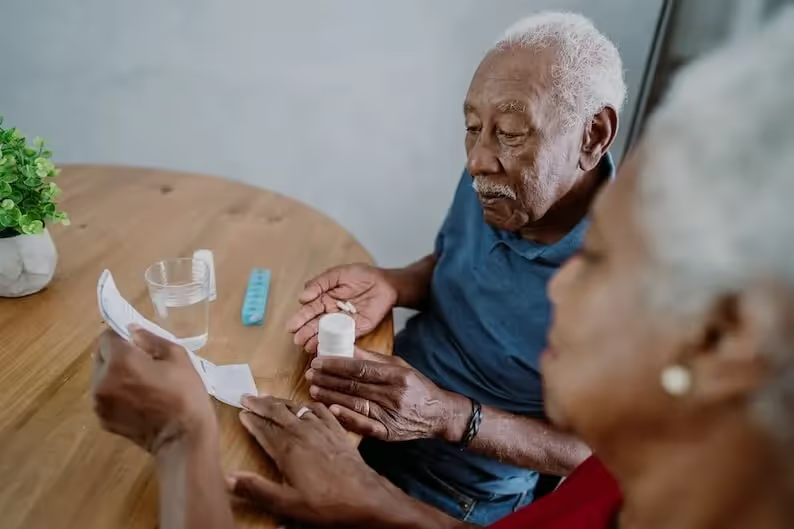Unfortunately, the older we get, managing our health often involves taking several medications, each serving a specific purpose. Whether it's for chronic conditions like diabetes, high blood pressure, or other common age-related issues, medication is crucial for maintaining well-being. However, with multiple prescriptions come the risks of medication errors. This can range from taking the wrong dosage to missing a dose entirely, which can lead to health complications. Here are essential tips for preventing medication errors and ensuring safe medication practices for seniors.
1. Keep an Updated Medication List
One of the easiest and most effective ways to prevent medication errors is by maintaining an up-to-date list of all your medications. This includes prescription drugs, over-the-counter medications, vitamins, and supplements. Ensure the list includes:
- The name of the medication
- The dosage
- The time of day it's taken
- The purpose or reason for taking it
This list should be shared with your doctor and pharmacist during every visit to ensure everyone involved in your care is on the same page. Keeping a copy in your wallet or phone is helpful for emergencies.
2. Follow Instructions Carefully
Always read and follow the instructions provided with your medications. Some medications may need to be taken with food, while others are more effective on an empty stomach. It's also important to be aware of any potential side effects or interactions with other medications you are taking. If anything is unclear, ask your healthcare provider or pharmacist for clarification. Never hesitate to ask questions if you're unsure how or when to take your medicine.
3. Use a Pill Organizer
A pill organizer can be a lifesaver, especially when managing multiple medications. These organizers come in different formats, such as daily or weekly compartments, and some are even labeled by time of day. A pill organizer can help:
- Prevent missing doses
- Avoid accidentally taking the wrong pill
- Make medication management easier
Consider using a smart pill dispenser that alerts you when it's time to take your medications. Some devices even notify a family member or caregiver if a dose is missed.
4. Set Alarms or Reminders
With busy schedules and memory lapses that naturally come with aging, it's easy to forget to take medications. Setting alarms on your phone, watch, or other devices can serve as helpful reminders. If you're not tech-savvy, enlist the help of a family member or caregiver to set up these reminders for you. Alternatively, some pharmacies offer medication reminder services that send text messages or phone calls when it's time for your next dose.
5. Be Aware of Drug Interactions
Seniors often take multiple medications, which can increase the risk of drug interactions. Some medications may interfere with each other, or with over-the-counter drugs and supplements, leading to unintended side effects or reduced effectiveness. Always inform your healthcare provider about all medications you're taking, including herbal remedies and vitamins. Before starting any new medication, ask your doctor or pharmacist if there are any potential interactions with your current regimen.
6. Have Regular Medication Reviews
Schedule regular medication reviews with your healthcare provider, especially if your prescription list grows or changes frequently. Your doctor can assess whether certain medications are still necessary, if the dosages need adjustment, or if there are safer alternatives available. A medication review can also help in identifying any errors in prescriptions or refills, potentially preventing future complications.
7. Avoid Pill Splitting Unless Directed
Some people attempt to split pills to save money or reduce dosage, but this can be dangerous. Not all medications are designed to be split, and doing so can result in uneven dosages, rendering the medication less effective or too potent. Always consult your doctor before splitting any medication. If pill splitting is recommended, use a pill cutter to ensure accuracy.
8. Stick to One Pharmacy
Whenever possible, fill all your prescriptions at the same pharmacy. Pharmacists can keep track of your medications and are more likely to catch potential drug interactions or duplications when they have a complete record of everything you're taking. They can also offer valuable advice on how to manage your medication routine safely.
9. Involve a Caregiver or Family Member
If you have difficulty managing your medications, ask a trusted family member or caregiver to assist you. They can help by reminding you to take your medicine, organizing your pill box, or even attending doctor's appointments to help keep track of new prescriptions or dosage changes. Don't hesitate to lean on your support system—having someone else involved can greatly reduce the chance of mistakes.
10. Use Technology to Your Advantage
Technology can be a powerful tool in preventing medication errors. In addition to using reminders and pill organizers, there are several apps designed to help manage medications. These apps allow you to set reminders, track what you've taken, and keep a digital medication list that can be easily shared with your healthcare provider. Some apps also alert you to potential drug interactions or refill needs, ensuring you stay on top of your regimen.
Be Proactive for Safer Medication Management
Managing medications as a senior doesn't have to be overwhelming. By staying organized, asking questions, and involving your healthcare team, you can significantly reduce the risk of medication errors. Remember, your health and well-being are worth the extra effort to ensure you take your medications safely and correctly.




